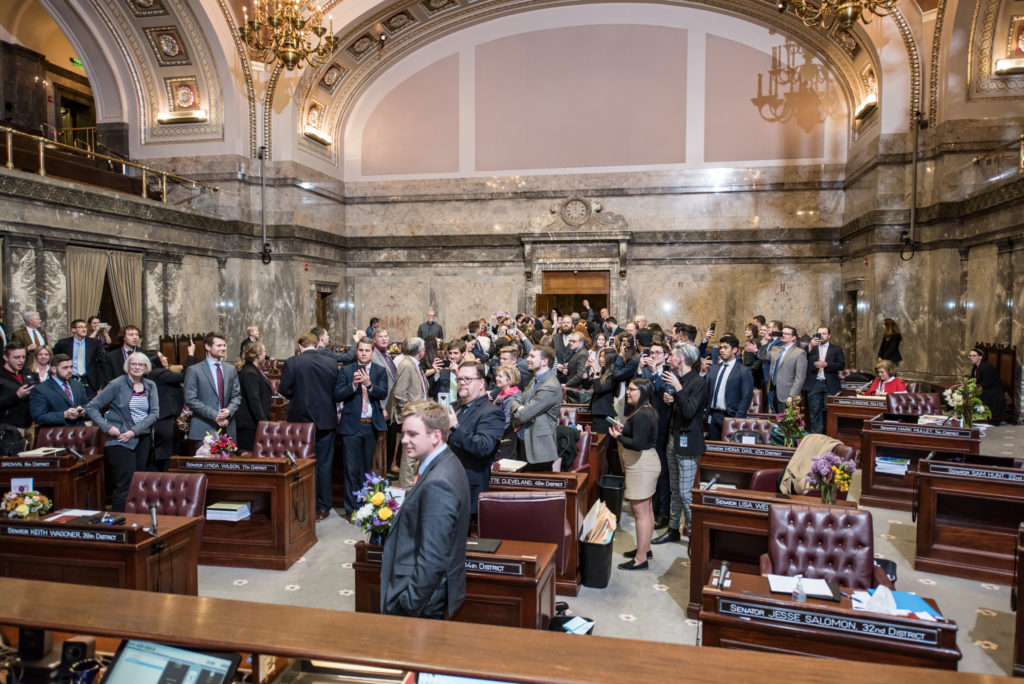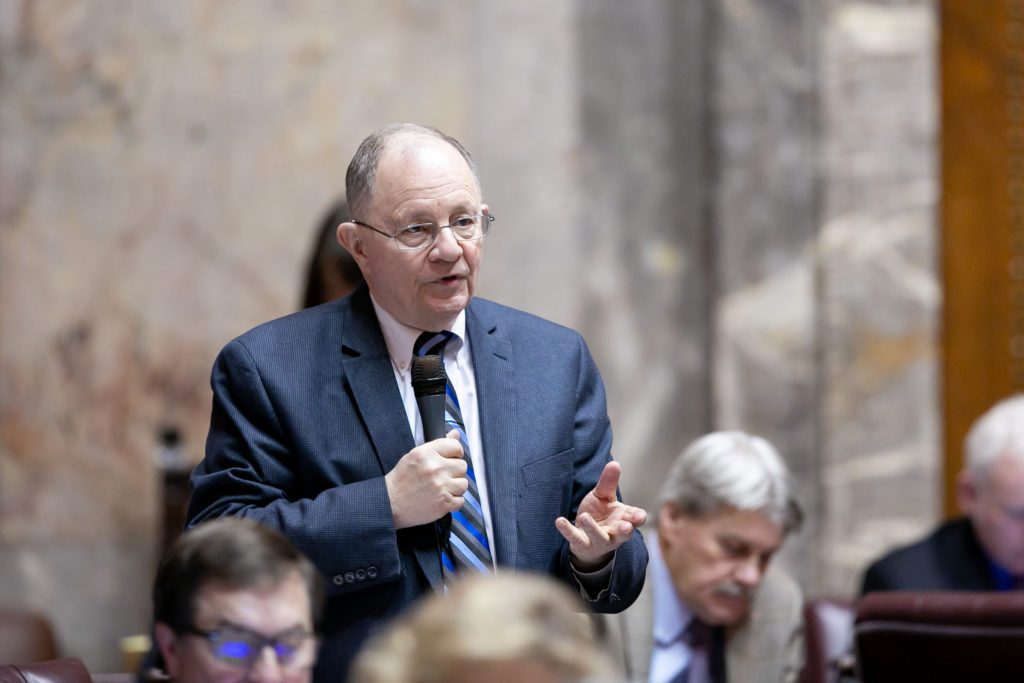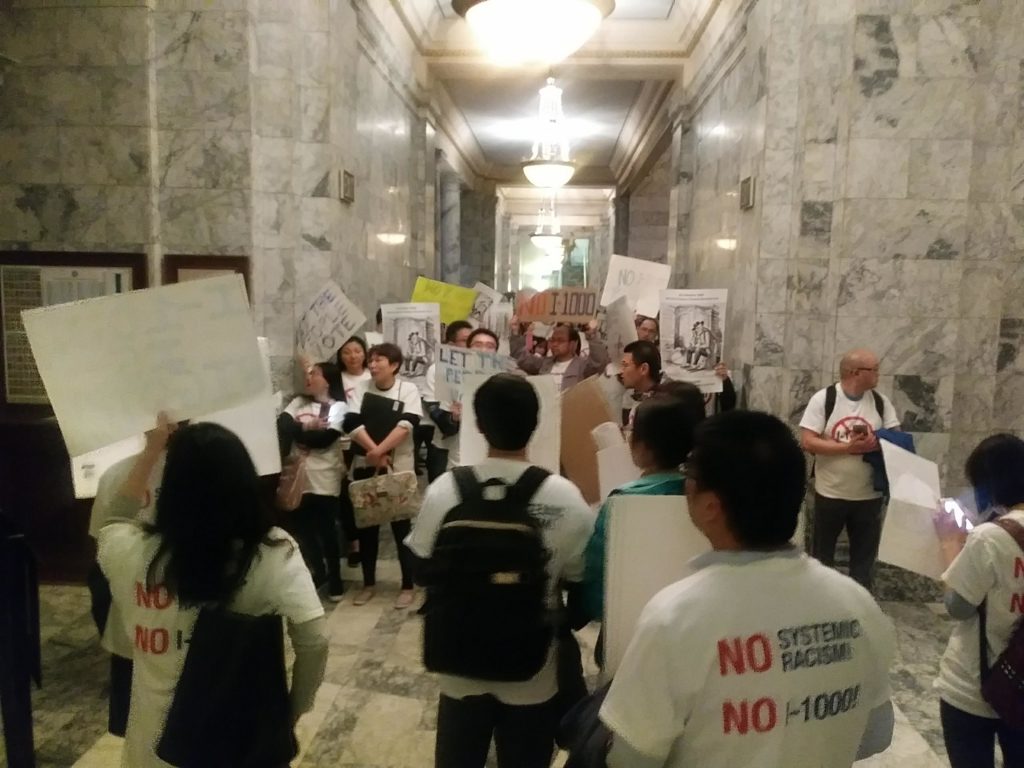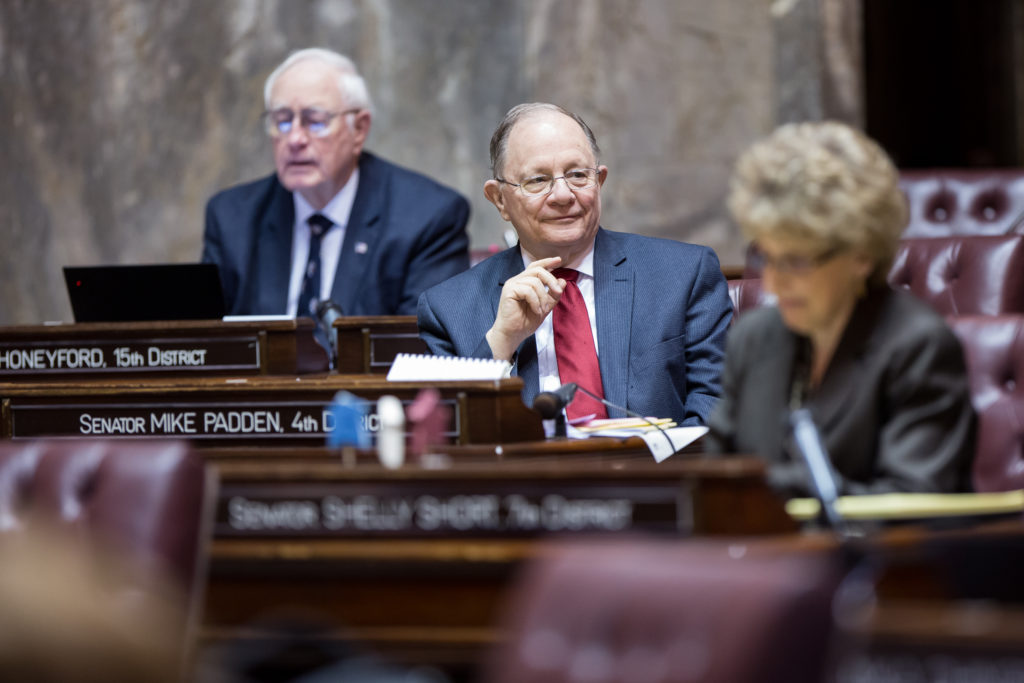The following newsletter was sent to Sen. Mike Padden’s subscribers May 2, 2019. To subscribe to Sen. Padden’s newsletters, click here.

At midnight Sunday in the Senate, crowds await the final gavel ending the 2019 legislative session.
New taxes and bigger government headed your way
Session ends, and long-ranging problems can be expected in its wake
Dear friends and neighbors,
We’ve finally wrapped up our legislative session, and not a moment too soon. Legislation passed this year will make it more expensive to live and work in Washington, and will challenge our state’s ability to remain competitive. There was a bright side – a number of bills on a host of subjects ranging from human trafficking to the rights of the developmentally disabled. But if we are to take a broad, general view, it must be acknowledged this was one of the most difficult sessions on record for the people of Washington.
The reason was one-party control of the Legislature. Democratic majorities in the House and Senate had the votes to pass anything they wished. Their members reflected the interests of the urban Puget Sound area, from which most of their members come. They showed little interest in the fact that most people outside King County feel differently. No matter how we argued on the Senate floor, we were unable to shake their belief that Washington just isn’t taxed enough. The result was enormous taxes the state doesn’t need, approved mainly because our colleagues had the opportunity.
It didn’t end with that. Much legislation introduced this year reflected a hardline viewpoint. Many of these bad ideas did not pass, but the proposals that went through were awful enough. We watched in dismay as our colleagues undid years of work on an equitable school-financing plan and passed measures that increase the power and reach of government.
I’ll tell you about it this week, both the good and the bad. The lesson of the session is that an unbalanced Legislature can do great damage when it ignores a significant portion of the state. We can be sure we will hear more about this issue in the months to come, as the effect of this year’s legislation becomes apparent.
Sincerely,

Sen. Mike Padden
A few bright spots

On the Senate floor.
Let’s start with the good things that happened this year.
- No income tax. Our colleagues have been pushing an income tax on capital gains for several years now – a “starter” income tax that almost certainly would be expanded to a general income tax if the courts give their OK. Wildly unpopular with Washington voters, an income tax is the holy grail for interests dependent on state spending, because it would allow the state to reach deeper into people’s pockets. Proposals for an income tax were heard early in session, but the idea proved too big even for the majority party to swallow.
- Agenda-driven proposals are defeated. Several of the worst pieces of agenda-driven legislation did not make it through. Among them: A measure that would have launched a mandatory Olympia-directed sex-education curriculum, starting in kindergarten. Banning booth rentals by hairdressers and barbers, essentially requiring them to work as employees. Requiring Washington farmers to file reports indicating whether they employ slave labor. Creating a body composed of state-agency heads and activist groups to dictate new regulations in the name of “environmental justice.” And low-carbon fuel standards, an idea that is already proving unworkable in California, driving gas prices way up to pay for carbon-reduction programs, much like the carbon tax rejected by voters last fall.
- Capital and transportation projects for the 4th District. Our delegation scored several wins this year, including funding for the Barker-to-Harvard interchanges on I-90 and a new overpass on Henry Road, improvements at Mt. Spokane State Park, water quality efforts at Newman Lake, clock tower restoration at Felts Field, and expanding recreational opportunities at Dishman Hills and Mica Peak. For more information, click here.
- Second Amendment rights. Many proposals affecting Second Amendment rights were introduced this session. What passed was a bill allowing police to temporarily confiscate weapons without due process. The bright side is that other proposals were defeated, including a restriction on magazine size and an unnecessary requirement that concealed pistol license holders undergo costly periodic gun-training courses. We need to remember that laws like these affect only those who are inclined to obey the law, and have no impact on those for whom the law has no meaning. One other bright spot — I was involved in a successful effort to pass a bill preventing disclosure of the names of those who participated in the state’s bump-stock buy-back program.
- Criminal justice legislation. Despite our conflicts on high-level issues, there was support on both sides of the aisle for several bills I sponsored. Bills that made it all the way through include a measure that will make it easier to prosecute human-trafficking crimes against children. Another bill requires law enforcement authorities to notify public and private schools when a violent situation warrants lockdowns or evacuations. I also was a co-sponsor of a bill that allows courts to impose community supervision in auto theft cases, for the first time in decades, which could help reduce the serious property-crime problem we have experienced in Spokane County.
Other bills I sponsored that passed were a measure prohibiting discrimination against the developmentally disabled in organ transplants, requiring mediation between elected county officials before they take their disputes to court, and giving county coroners authority to subpoena records in death investigations.
Now the bad news

Raucous protest breaks out Sunday night as the Senate passes Initiative 1000. Protestors, many of Asian descent, are concerned the measure will permit racial discrimination in college admissions and other programs. Uproar began as the vote was announced, and the visitor galleries were ordered cleared. The demonstrators moved to the Democratic entrances to the House and Senate, and their shouts of “Shame on you!” and “Vote them out!” shut down business in the Senate for half an hour.
- $2.4 billion in unnecessary taxes. What happened this year on the tax-and-spending front was hard to believe. This was a year of record increases in tax collections, because previous legislatures, under balanced control, resisted a heavy touch. We had more than $5 billion in additional tax collections to work with this year than the last time we wrote a budget, more than enough to meet every obligation and leave plenty for new programs or tax relief. We didn’t need the money, but our colleagues have been arguing for years that Washington should be taxed at a higher rate, and this was the first time in a decade that circumstances allowed them to do it. We will see higher taxes on banks, real estate transactions, small business, travel agents and others, to pay for a wish-list that might easily have been delayed until our next budget session.
- Failure of DUI legislation. A big personal disappointment of the session, a measure that would have sent more repeat offenders to prison failed in the final hours of the session. Washington law makes the 4th conviction a felony, and allows courts to consider convictions within the last 10 years when issuing sentence. My proposal would have extended the look-back to 15 years, meaning about 135 more repeat offenders would do prison time at any given point. This proposal enjoyed broad support on both sides of the aisle, but the opposition of individual members prevented its adoption in the House. The reason they gave was cost — $2 million a year – though this year’s record revenues and record tax increases make that argument seem rather thin. You can read more about this issue here.
- Eliminating choice in school vaccinations. HB 1638 eliminates “personal exemptions” from school vaccination requirements, meaning students and parents will have no choice in the matter. This proposal was one of the biggest concerns for 4th District residents, as well as for citizens statewide. This issue requires us to balance the desires of the community against the rights of the individual, but ultimately we should respect the ability of students and parents to make decisions for themselves about a most personal issue.
- Undoing our school-financing compromise. The Legislature’s biggest challenge these last several years was devising a new school-financing system that provided adequate state funding for basic education, equitable for every student in the state. Unfortunately, at the urging of the state teachers’ union, our colleagues in the majority party have succeeded in undermining the deal. Last year they permitted school districts to award budget-busting salary increases with one-time funds. This year, when school districts came to the Legislature seeking more money to sustain those salary increases, our colleagues raised a cap on local levies, allowing local taxes to creep back up. The result will be higher local levies on top of the higher state levy, and likely will result in another lawsuit that rightly points out students in property-poor districts are shortchanged. This disastrous outcome will surely lead to more pressure for additional tax increases in the future.
- The Green New Deal in this Washington. While Congress debates extreme proposals from the left, the Legislature in this state was busy passing them. SB 5116 will have dramatic effect on the state in years to come, requiring electric utilities to abandon all fossil fuel use by 2045. Coal already is on the way out, but this also will force utilities to stop using clean-burning natural gas, our best backstop for intermittent windpower. No technology has yet arisen to take its place. Our cheap, clean hydropower advantage will be eroded, and higher power bills and supply problems are likely. Other green legislation this year will force costly building retrofits and drive up gasoline prices statewide, imposing what amount to regressive taxes that will hit those of low incomes the hardest. No impact on climate change should be expected. Also passing this year is a $750,000 study on destroying the Snake River Dams – a decision that is up to the federal government, not the state — as if all the previous federal studies rejecting the notion were insufficient, and a new one might provide the answers urban environmental groups would like to hear.
- New payroll tax. The majority imposed a new payroll tax for a long-term care trust fund, designed to provide nursing home insurance based on individuals’ contributions. Unfortunately, the maximum benefit is meager, about equal to three or four months’ care, and Washington workers will be taxed involuntarily to pay for it, at a rate of 0.58 percent of wages. Watch for efforts to increase this billion-dollar tax when it proves inadequate. Nursing home insurance is a function better provided by the private sector, as this program will surely demonstrate.
- Restricting worker choice in union membership. The Supreme Court’s ruling in the Janus case last year declared that public employees cannot be compelled to pay union dues or fees, but the majority party did its best to undercut it. HB 1575 imposes new hurdles and restrictions on workers who wish to terminate union memberships, contrary to the spirit of the decision, if not the law.
- Making Washington a sanctuary state for illegal immigrants. SB 5497 forbids Washington law enforcement authorities and other public agencies from cooperating with federal officials charged with enforcing immigration laws. This politically motivated protest undermines respect for the law, and is more properly a matter for Congress, which sets immigration policy.
- Enabling racial discrimination under the law. The Legislature passed Initiative 1000, a measure that restores affirmative action programs banned by voters with an initiative in 1998. The majority party made the unfortunate decision not to refer this measure to the ballot, eliminating voters’ ability to choose. The measure will permit state programs to discriminate based on race, elevating some groups at the expense of others. Furious protests erupted when this measure was approved on the final day of the session. Many demonstrators were of Asian descent, as they could be denied opportunities for college admission that would be warranted based on merit. State law provides that an initiative passed by the Legislature becomes law 90 days after passage, unless referendum petitions containing 129,811 valid signatures are presented to the Secretary of State’s office before that time, in which case such a measure would appear on the ballot.
Closing the book on the 2019 session

The final gavel Sunday night brought a close to one of the most trying legislative sessions any of us can remember. As we pack our bags and prepare to turn home, let us give our thanks to the many who made our work possible. Special thanks are due to those who staffed our office and worked long hours under often-difficult circumstances — my legislative assistant, Janet Voye, session aide John Jourdan and session intern Dagny Ahrend.
On Monday, May 6, we will be reopening our district office at 408 Mullan Road in Spokane Valley. Our phone number is (509) 921-2460.
REMINDER: We have published a new edition of our Government Guide, a handy directory of contact information for government offices and service providers in the 4th Legislative District. If you did not receive a copy in the mail, please contact us and we will be glad to send you a copy. This directory also is available online here.
We hope you will contact us with your comments and concerns about state government. It was an honor to represent you this session, and we look forward to hearing from you.










